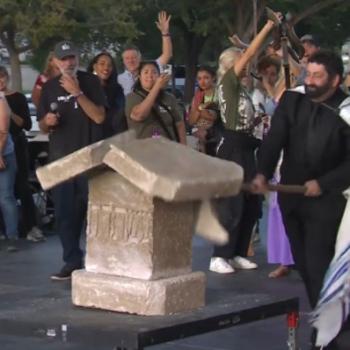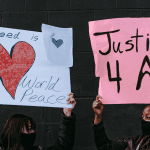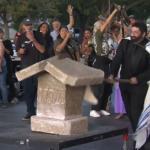1. As I noted on Twitter, when a great comedian dies, we tell jokes because it would be inappropriate and disrespectful not to do so. Antonin Scalia was a sharp-tongued, pugnacious, partisan political brawler — a man who loved and lived for contentious political argument. It is entirely appropriate, then, that his death should spark another fierce round of such argument. That honors his memory.
2. It is ironic, though, that even before initial reports of his death had been confirmed and picked up by national news outlets, Scalia’s political allies were already publicly advocating that the constitutional process for appointing his successor should be abandoned. Using the occasion of his death to score partisan political points, even before his body was cold, is in keeping with the spirit of the man. That much he would have approved of. But the specifics of that argument — rejecting the Constitution itself and rejecting the clear original intent of its authors — goes against everything that Scalia ever argued for.
3. Or, perhaps, it doesn’t. Maybe it simply unmasks the lofty rhetoric of Scalia’s proclaimed devotion as nothing more than a convenient cover for the raw pursuit of power.
It’s something of a major theme here, after all, that crude and simplistic hermeneutics dishonor and distort the texts they claim to revere. “For the letter kills, but the spirit gives life,” and a proof-texting devotion to the infallible letter always seems to be a mask for power — for the defense and preservation of injustice and oppression. This is the actual function of such hermeneutics, so it’s hard to accept it is not also their intended function. Whatever the intent, though, the practical function of Scalia’s fundamentalist hermeneutic proved to be the same as the that of the fundamentalist biblical hermeneutics that inspired it. And just as erratically, sporadically principled.
4. I’ll give him this, though: Rewatch Stephen Colbert’s legendary White House Correspondents Dinner performance. Watch the facial expressions and body language of President George W. Bush and of the White House press as Colbert directs his jokes toward them and the room settles into an icy quiet. Then watch Antonin Scalia howl with laughter as one of the few people in that room — other than Colbert himself — who seemed to be enjoying the evening, even when the jokes were at his expense.
Update: Here’s Stephen Colbert recounting Scalia’s response to what he calls his “speech” at the White House. While the ghosts of Richard Pryor and Lenny Bruce and Bill Hicks were singing gloria in excelsis, Colbert himself couldn’t even leave when it was over and had to return to his seat in a room that now hated him. Except for one person:
5. I’m not good at predicting or gaming out all the three-dimensional chess of national politics. I have no idea what a sudden vacancy on the Supreme Court means for the Republican and Democratic primary races, and I’m not interested in reading lots of think pieces speculating on that. But I think I do understand what’s at stake in replacing Scalia on the court. As Rick Hasen put it, “It is the beginning of the most important civil rights debate of our time.”
6. I also have no particular insight on who might be appointed by the president to replace Scalia. I can Google the same bunch of names you may have seen, but I have no idea how to evaluate the likelihood of any of them being named next.
It has been reassuring, though, to read so many articles speculating on the next nominee because of how emphatically they insist that people my age are very, very young. Someone my age — 47 going on 48 — is routinely described in such articles as astonishingly youthful, with decades of productive work ahead of them. That’s always nice to read.
I just wish prospective employers took the same view of applicants’ résumés, because in the rest of the job market, people my age are unacceptably old. If they see that you graduated from college in 1990, they figure you’ve only got 20-some years to retirement, and that you’ll probably die before that, so why even bother?
7. The San Antonio Express-News did a pretty terrific job being first to report this story.
[Update to add one more.]
8. Scalia’s death also underscores the wisdom of the best decision that former Pope Benedict XVI ever made — stepping aside and resigning instead of dying in office. That allowed those of us who had great cause to celebrate the end of his papacy to do so without that celebration getting tangled up with the event of his death.
Supreme Court justices, like popes, are granted vast power as ultimate arbiters — power mostly unchecked by anything other than their own integrity and their purported commitment to principle. To be granted such enormous power until the day you die means, inevitably, that the day you die will be a day of celebration for everyone you’ve wielded that power against. The only ways to prevent your death from being the basis for such celebration would be either to: A) follow Benedict’s example and step aside before you die in office; or B) maybe use your power justly, instead of as a tool to grind down and oppress, so that your death doesn’t have to be widely perceived as a source of liberation.
















